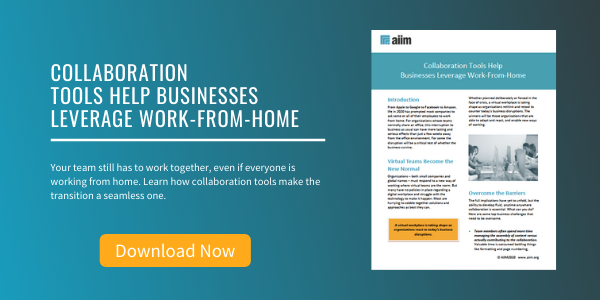
4 Reasons for Replacing Email with New and Better Collaboration Tools
The exponential growth of information means exponential growth of email. If you today receive 100 new emails per day, will this then become 1,000 new emails per day in 2020? Whatever the number is, it’s time to rethink the role of email within your organization.
Like it or not, but email is today the glue that ties an organization together. We use it to communicate with our bosses, colleagues, partners, and customers. We use it for storing important messages, and a lot of important collaboration happens in email.
Below are 4 reasons for replacing email with new and better collaboration tools:
1. Email turn collaboration into information chaos. Email is a really good communication and notification tool, but we quickly end up with chaos when multiple people try to use email to discuss a topic or for developing something. We get reply one vs. all and reply first message vs. later messages. Email also creates knowledge silos - important information and knowledge gets locked down or lost in personal and corporate email boxes.
2. Email locks down information and knowledge. Gallup has found a correlation between the level of employee engagement and customer service by 10%, productivity by 21%, and profitability by 22%. Email hinders this since information and knowledge are locked down in personal and corporate email boxes. We need to replace these silos with open and flat networks.
3. Email distracts knowledge workers. New incoming emails have a tendency to distract us. We end up in a responsive mode instead of spending our time being strategic and creative. We used to have a “You got mail” audio alert in the old days - it’s now best to turn off all email notifications to be productive. We should only respond to email certain times of the day, and some organizations have also implemented email free days. For me, the best place to be creative is the treadmill since I am then 100% disconnected!
4. Email lacks information filters. “I don’t have an information overload problem, I have filter failure,” said Clay Shirky. Most of us have only spam-filters for our emails - we don’t know if the rest of the emails are important or not until we look at them. Google has tried to fix this by adding a filter for important emails, but this feels quite basic. Hashtags have become my information filters for Twitter. I don’t pay any attention anymore to the tweets of the 4000 or so people I follow - I only pay attention to hashtags. And I only look at this now and then. If it is important, then it will come by again due to retweets or comments. Enterprise social software provides the same for the enterprise. You don’t have to look at every update. Focus instead on your group and trust that it is important; it will come by again due to comments and Likes.
We need email for external and internal communication, but let's get rid of email as a collaboration tool.
About Atle Skjekkeland
Atle Skjekkeland joined AIIM in 2004 as Managing Director for its European operation, was promoted to Vice President for AIIM in 2006, and became Chief Operating Officer in 2011. He is responsible for marketing, sales, delivery, and support of all AIIM products and services, which include events, webinars, training, research, and membership. Atle is the architect and driving force behind AIIM’s Certificate programs, which have had 20,000+ course attendees over the last 5 years. He has delivered workshops across the world, and established training partnerships on almost all continents. He is also the architect behind the new Information Certification introduced in 2011 and available worldwide via Prometric exam centers. An early adopter of social media to improve member communication, brand exposure, and Web traffic; over the last few years he has developed AIIM’s strategy for using the Web as a platform for education and networking. Atle holds a Master’s degree from the Norwegian School of Economics and has 15+ years of experience working within IT. He is eager to find new ways technologies can add value, disrupt markets, and create a blue ocean opportunity. Atle is also interested in the future for information workers with improved usability, mobility, knowledge sharing, and retention. Renowned as a very energetic and lively speaker, Atle is frequently asked to present at AIIM, Gartner, and industry conferences throughout the world. His background as one of the most experienced and well-known ECM trainers in the world makes him knowledgeable in a wide range of topics.



